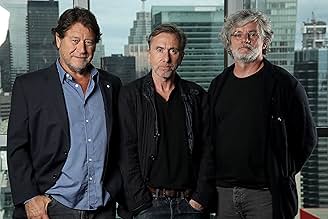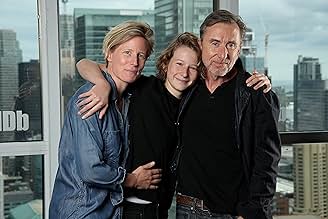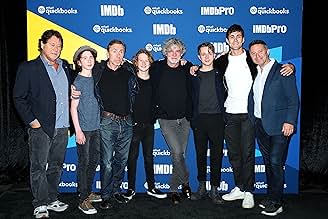IMDb-BEWERTUNG
6,5/10
5742
IHRE BEWERTUNG
Tim Roth und Clive Owen in einer emotionalen Detektivgeschichte, die sich über zweieinhalb Kontinente erstreckt. Unter den atemberaubenden Enthüllungen des Films lodern die Schrecken eines K... Alles lesenTim Roth und Clive Owen in einer emotionalen Detektivgeschichte, die sich über zweieinhalb Kontinente erstreckt. Unter den atemberaubenden Enthüllungen des Films lodern die Schrecken eines Krieges.Tim Roth und Clive Owen in einer emotionalen Detektivgeschichte, die sich über zweieinhalb Kontinente erstreckt. Unter den atemberaubenden Enthüllungen des Films lodern die Schrecken eines Krieges.
- Regie
- Drehbuch
- Hauptbesetzung
- Auszeichnungen
- 8 Gewinne & 11 Nominierungen insgesamt
Áron Rátkay
- Cello Boy
- (as Rátkay Áron)
Annamária Makai
- Piano Girl
- (as Makai Annamária)
Empfohlene Bewertungen
"The Song of Names" is a film with Clive Owen and Tim Roth elegantly directed by Francois Girard. It tells the story of two young boys who develop a friendship over a shared love of music. Young Polish violin prodigy Dovidl Rapoport comes to live with the family of Martin Simmonds in the days preceding the German bombings of London, England during WWII.
The story continues showing different periods of Dovidl and Martin's lives from adolescence to mature adulthood. With the excellent acting, screenplay by Jeffrey Caine and Girard's conscientious direction, the film is a gift to the viewing public!
The story continues showing different periods of Dovidl and Martin's lives from adolescence to mature adulthood. With the excellent acting, screenplay by Jeffrey Caine and Girard's conscientious direction, the film is a gift to the viewing public!
The Song of Names, a way to remember the names of the dead from the holocaust, is poignant and deeply moving. This film did not do it justice.
Dov, the boy genius from Warsaw is left by his father in London, under the care of an English non-Jewish family, where he can continue to hone his talent of playing the violin. The father returns to Poland to rejoin the rest of his family on the brink of the breakout of world war two.
We are then left with Dov, his journey of life and that of his English "brother" Martin.
Unfortunately, Dov is never very likeable at any of the ages portrayed in the film and to be honest, neither is Martin nor Martin's wife, Helen.
The suffering of those around them, Martin's father, the rabbi, the Jewish survivors in London, the polish girl in Warsaw and Joseph, the other polish violinist, all of whom we only get fleeting glances of, is more affecting than that of the central characters.
I simply don't know what to make of this film.
Watch it by all means, for the music alone and to understand the meaning of the title and maybe you will have a different reaction than I did.
Dov, the boy genius from Warsaw is left by his father in London, under the care of an English non-Jewish family, where he can continue to hone his talent of playing the violin. The father returns to Poland to rejoin the rest of his family on the brink of the breakout of world war two.
We are then left with Dov, his journey of life and that of his English "brother" Martin.
Unfortunately, Dov is never very likeable at any of the ages portrayed in the film and to be honest, neither is Martin nor Martin's wife, Helen.
The suffering of those around them, Martin's father, the rabbi, the Jewish survivors in London, the polish girl in Warsaw and Joseph, the other polish violinist, all of whom we only get fleeting glances of, is more affecting than that of the central characters.
I simply don't know what to make of this film.
Watch it by all means, for the music alone and to understand the meaning of the title and maybe you will have a different reaction than I did.
There are some great aspects to this film. The scenes of childhood & the actors in the midst of WW2 are well depicted. Safe relatively in England, far safer than Poland.
The time shifting sequences flipping from one era to another made things stilted & confusing & annoying more than interesting.
Excellent sets in Poland esp Treblinka & in Hampstead where the main character encounters a survivor of Treblinka & then learns about his own family.
Worth watching but this film could have been outstanding.
Exploring the aspect of the holocaust on those who had managed to leave or not but survive makes a great basis for exploring humanity & the challenges of going on after loss.
The story meanders a lot which gets in the way of building a sense of connection to the adults; the earlier scenes when the key characters are still boys manages to build that connection.
The time shifting sequences flipping from one era to another made things stilted & confusing & annoying more than interesting.
Excellent sets in Poland esp Treblinka & in Hampstead where the main character encounters a survivor of Treblinka & then learns about his own family.
Worth watching but this film could have been outstanding.
Exploring the aspect of the holocaust on those who had managed to leave or not but survive makes a great basis for exploring humanity & the challenges of going on after loss.
The story meanders a lot which gets in the way of building a sense of connection to the adults; the earlier scenes when the key characters are still boys manages to build that connection.
This story is so effective and so emotional, that it sends chills right down my spine. I feel so connected with the story and the characters, that I feel their pain and their anguish. It is a wonderful film.
Yes, this is a wonderful and memorable film. The director, Francois Girard, and, I suspect, the same Canadian production company were involved in the 1998 RED VIOLIN. Like that film it takes place over multiple time periods, in this film clearly stated to be 1951, 1986, and the earliest, unidentified time which can be inferred to be sometime between March and September 1939. The scene shifts back and forth a good deal and some critics found this confusing and destructive of continuity but I found no difficulty in following the story line. Memory is not linear and orderly but rather fragmented and out of sequence, particularly when dealing with highly charged emotionally traumatic experiences. This is an exceptionally intelligent screenplay where not everything has to be spelled out. It's true that a key plot point mystery is fairly predictable. Yet the story builds to a wrenching climax in a way you don't see every day in the movies.
Tim Roth plays well against type as a quiet, introspective Brit. The score composer, Howard Shore, was involved in composing the impressive music in the Lord of the Rings and does an award-deserving job here. I rate the film at 3.5/4 stars. Strongly recommended for everybody, especially any serious music student as well as anyone of Jewish background, particularly of GenX through to Millennials.
Wusstest du schon
- WissenswertesSaul Rubinek (Mr. Feinman) is the son of Holocaust survivors and was born in a refugee camp in Germany.
- PatzerThe Yellow Cab used in the film is 1991-1996 Chevrolet Caprice. This sequence of film took place in the first half of 1980s.
- VerbindungenFeatured in 2020 Canadian Screen Awards for Cinematic Arts (2020)
- SoundtracksPartita for Violin No. 2, Chaconne (Clarinet Arrangement)
Written by Johann Sebastian Bach
Performed by Eszter Lugosi
Top-Auswahl
Melde dich zum Bewerten an und greife auf die Watchlist für personalisierte Empfehlungen zu.
- How long is The Song of Names?Powered by Alexa
Details
- Erscheinungsdatum
- Herkunftsländer
- Offizielle Standorte
- Sprachen
- Auch bekannt als
- İsimlerin Şarkısı
- Drehorte
- Produktionsfirmen
- Weitere beteiligte Unternehmen bei IMDbPro anzeigen
Box Office
- Bruttoertrag in den USA und Kanada
- 1.077.584 $
- Eröffnungswochenende in den USA und in Kanada
- 39.452 $
- 29. Dez. 2019
- Weltweiter Bruttoertrag
- 1.141.187 $
- Laufzeit1 Stunde 53 Minuten
- Farbe
- Seitenverhältnis
- 2.39:1
Zu dieser Seite beitragen
Bearbeitung vorschlagen oder fehlenden Inhalt hinzufügen

Oberste Lücke
By what name was The Song of Names (2019) officially released in India in English?
Antwort























